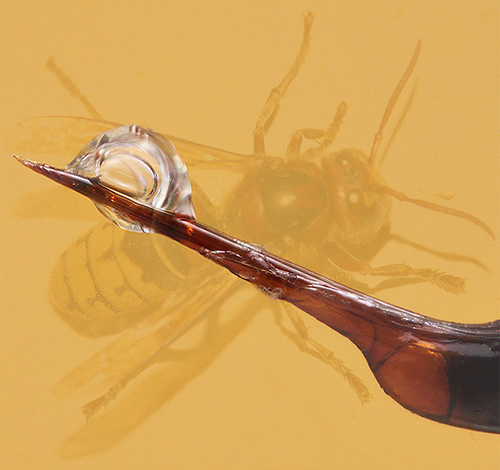
The hornet's poison is one of the strongest among insect venoms in general. However, the strength of the poison and the consequences of its entry into the human body largely depend on the type of hornet.
With full confidence we can say that every hornet is poisonous, because has a sting associated with a gland producing a whole range of toxins. Moreover, each specific species has its own specific poison.
For example, the bite of a common European hornet, which gardeners, beekeepers and agricultural workers most often encounter, differs little in its pain and consequences from the bite of a honey bee or a usual paper wasp.
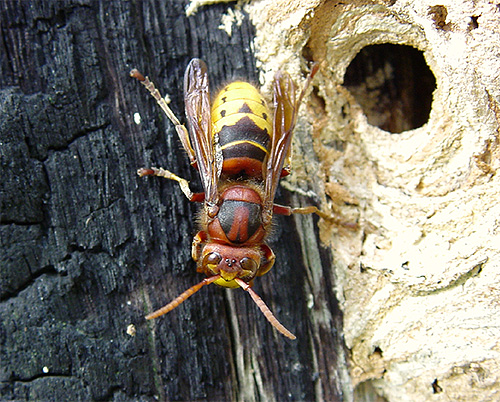
At the same time, the bite of a giant Asian hornet is extremely painful and can be fatal in severe cases.
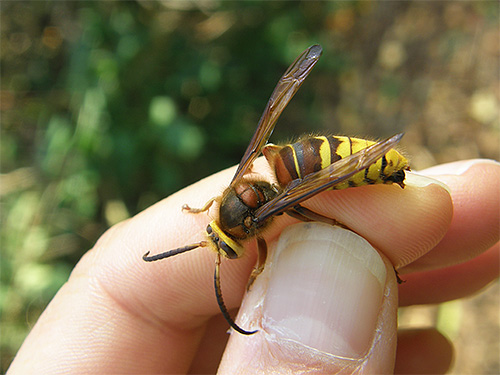
It is interesting
According to a specially developed sting strength evaluation system developed by American researcher Justin Schmidt, the bites of large hornets were marked 4, along with the bites of large road wasps.Only the South American ant-bullet bites them - on the Schmidt scale, its bite pulls on 4+.
Despite the fact that the hornet is poisonous, it rarely uses its poison when hunting: it does not like to waste precious means of protection, but to kill various forage arthropods it uses powerful jaws. The exception is large and solid prey - in this case, the wasp can use poison.
In general, the hornet prefers to use its toxin only for self-defense or defense of the nest. However, if it happened that someone got into the personal space of the hornet, you should be ready for any outcome.
The danger of poison of hornets: the reaction of the human body to him
Now let's understand the action that poisonous hornets have on the human body. The poison of the hornet is dangerous primarily because it contains many lytic components, leading to the breakdown of cells at the site of the bite. This explains the instantaneous appearance of edema and inflammation. Sometimes the ingress of poison into the tissue can cause an abscess.
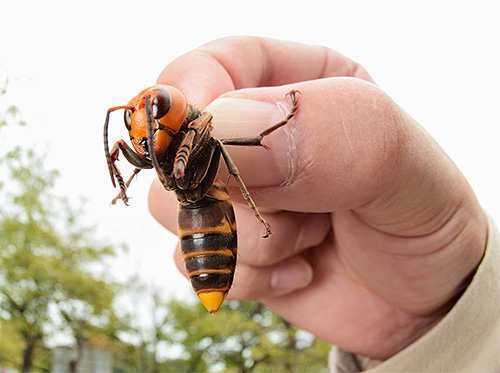
If a person has undergone numerous bites, not only the skin cells, but also the walls of blood vessels are damaged, which leads to local hemorrhages. In special cases, this causes damage to the internal organs, and if you do not consult a doctor in time, you can wait for the development of necrotic tissue damage.
Feedback
“That day I just worked in my garden and sat down on a mound of grass under a tree. It turned out there was a sparrow bee sitting (local name giant asian hornet). She stung me in the buttock, but it seemed to me that I sat on a hot nail. I don't remember how I felt afterwards. I ran home, but before him it was about half a kilometer, and every step was given in the lower back with severe pain. I just managed to cross the river and fell already on the road. Probably there they picked me up. I came to myself only in the hospital. I had extensive edema, half-spins were swollen, I was constantly injected with painkillers and antipyretic. The pain was still so severe that I could not lie down except on my stomach. ”
So Yang, Thaybin
In addition to the effects already listed, the poison of large hornets causes headaches, rapid heartbeat, fever. These symptoms are often aggravated by an allergic reaction, resulting in severe cases of anaphylactic shock.Another type of body reaction to the poison of the hornet can be shortness of breath, which appears due to an increase in lymphatic vessels.
It is worth noting that, without the complications described above, the hornet poison has a strong effect on the nerve endings, causing acute pain in a person who has been stung by a poisonous insect. In some cases, it itself can lead to a shock.
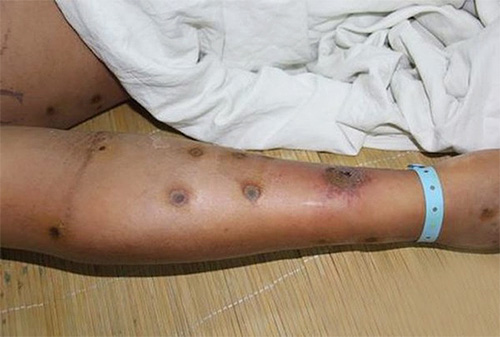
Despite the suffering caused to the person, the hornet injects only a little poison into the wound in one bite - no more than 0.5 mg, after which it takes out the sting. This hornets and other wasps are different from the bees, which leave their weapons in the body of the enemy, along with part of the intestine, thereby condemning themselves to death.
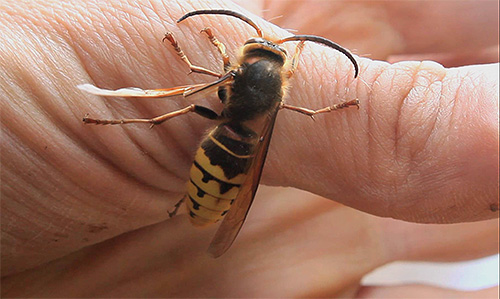
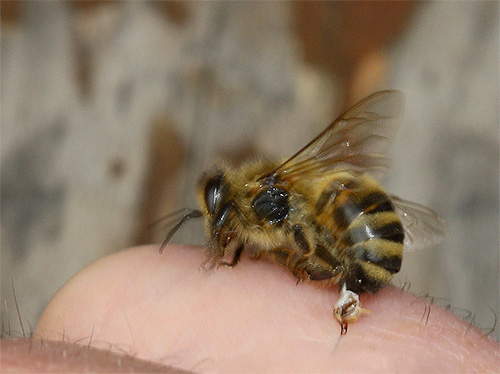
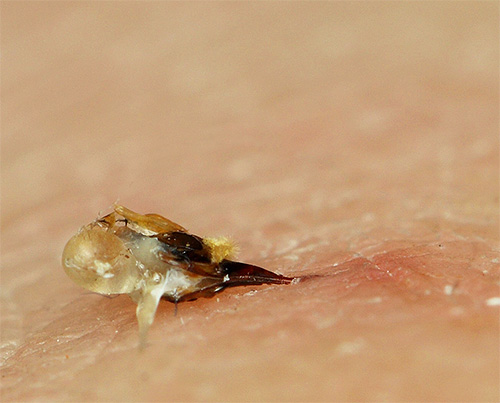
Poison hornets are able to sting the victims and enemies many times, but the bee leaves more poison in the wound when stinging. It is not surprising that the common European hornet and almost one and a half times smaller bee sting about the same.
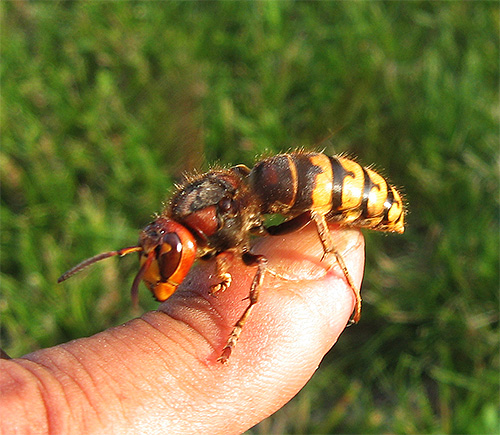
Feedback
“All the stories about poisonous hornets are fairy tales. Well, they are big, well, sting. But no more pain than bees. Anyway, they are very peaceful insects. For one year I worked as a security guard in the apiary, so the bees actually ate every day.And the next year, hornets built a nest right on the barn of the house, so only one bitten me all the time. I won't say that something like a bite differs from a bee sting. ”
Ivan, Trofimovo
Some chemistry: what does poison consist of?
The action that has the poison of the hornet, due to its composition. The hornet is poisonous due to a combination of several neurotoxins, substances that excite nerve endings, as well as dissolving cell membranes. That is why the result of a bite leads to a complex lesion of various organ systems.
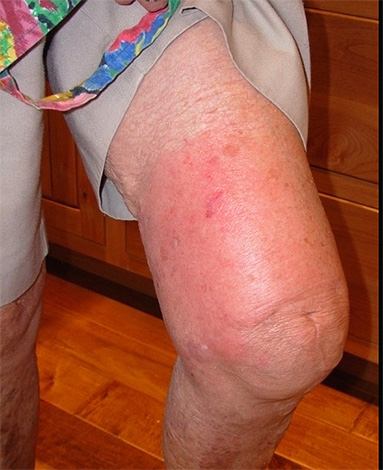
The main active components of the poison of the hornets are:
- Phospholipase A2 is an indispensable component of the venom of snakes, bees and wasps. It leads to the dissolution of the components of the cell membranes, the release of their contents into the intercellular space and the development of an inflammatory reaction.
- Orientotoxin is a poison with a similar effect, also affecting the cell membrane.
- Acetylcholine, which directly activates the nerve endings and causes severe pain.
- Histamine, which increases the pain effect and causes the body’s immune response in the form of an allergic reaction.
- Mastoparan is a specific peptide found in large quantities in hornet venom, which causes histamine to be released from mast cells by a chain reaction. Not surprising that hornet bites are so allergenic and so easily lead to anaphylactic shock.
A few more components that are included in the poison of the hornet increase the local tissue response and lead to rapidly spreading general toxic effects. It is worth noting that in some cases, the poison of the hornet can lead to renal failure.
The most venomous hornets
The most venomous hornets in the world are representatives of the species Asian giant hornet and its various subspecies. These wasps are up to 5.5 cm long, their wingspan is up to 6 cm, and several dozen people die from their bites every year. After stinging with giant Asian hornets, edema with inflammation quickly develops, multiple spreading symptoms appear, and anaphylactic shock often occurs.
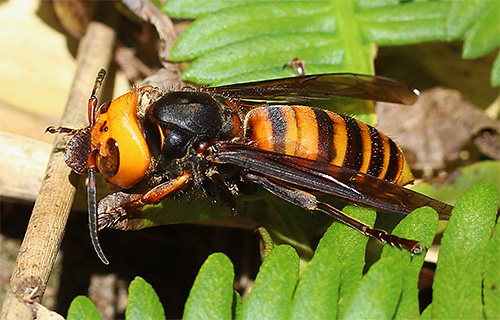
Often, when giant poisonous hornets protect a nest by attacking a person in a group, hemorrhages into internal organs and numerous necrotic tissue damage can occur in their victims.
Feedback
“Two months ago, a patient was discharged from our hospital, who was bitten by more than twenty hornets. He had an impaired kidney function, there was a serious intoxication,the most bitten hand was enlarged to monstrous size, and the throat was swollen, and for normal breathing it was necessary to insert a catheter into the airways. He had necrosis on the fingers of his sore hand, and his little finger had to be amputated. ”
Homi Niyashi, Kochi
It may be noted a certain dependence of the poisonousness of the hornets not only on their size, but also on the behavior. So, for example, hornets that live in our country are small and do not pose a serious danger. In addition, "our" hornets are insects relatively peaceful; even in pursuit, they prefer not to attack, sting only when they capture or defend a nest.
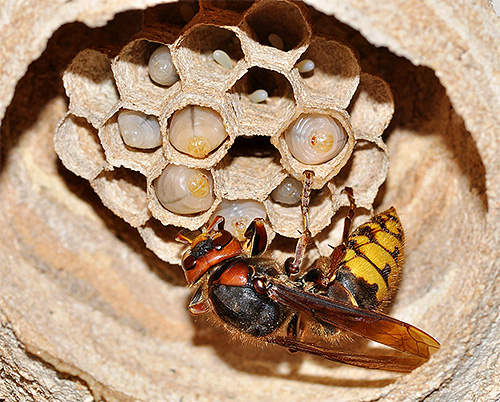
In contrast to the European, japanese hornethaving about the same magnitude, is aggressive and has a habit of attacking in a group. As a result, encounters with these poisonous hornets seem more dangerous than even the bites of individual individuals of gigantic relatives.
Is the poison of hornets useful and is it possible to buy it?
Unlike so valuable bee, poison of hornets does not bring any benefit. It does not contain those components for which bee venom is so revered, therefore no experimentally proven treatment methods based on it are known.
In addition, it is much more difficult to get poison of hornets, than bee. Not surprisingly, in the countries of Southeast Asia, where even such exotic products are still used in traditional medicine, the price of venom hornets is fabulous.
To find out the price of the poison of this insect through official sources is almost impossible, since this market is not closed for “not our own”. If one of the uninitiated is specifically asked to acquire the poison of the hornet, then he will most likely get a fake, the price of which will be very different from reality.
In general, no matter how venomous the hornets are, they should be treated as neighbors, with which it is necessary to reckon. When they do not occupy living quarters and do not settle near the apiary, these insects will not cause harm and they will not attack anyone if they behave correctly.
If, nevertheless, you are in a situation where you have been bitten by an insect, presumably a hornet, you should immediately seek medical help.
Useful video: the dangerous bites of wasps and hornets
Hornet attacks on humans and how to defend against them

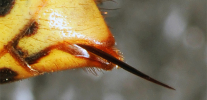
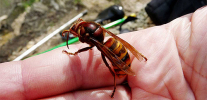
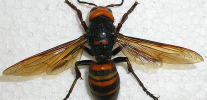
When I saw the hornet, I froze.
Hornets nest in the attic of a village house in our Tver region. They don’t interfere in any way, but the problem is that they fly from the attic into the hallway and can fly into the house into the light. Nests were removed several times from the attic, although they do not use the old ones, but the new ones are made nearby, which is extremely unpleasant.
Sting is not specifically stinging, but my Ma has been stung several times in the feet, as she walks barefoot in summer, and they can safely crawl on the floor. In general, in such proximity, they still cause shivering and negative reaction, so we are forced to get rid of them almost every year, but they fly at the station, and there we don’t touch them. Again, there are no more wasps on the plot.